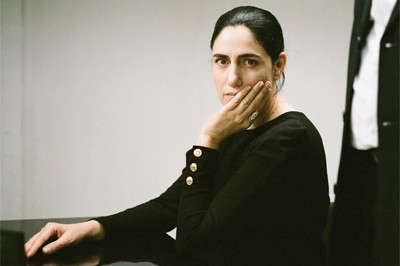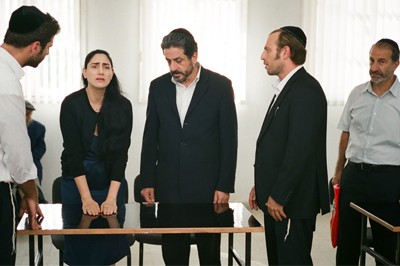| Reviews & Columns |
|
Reviews DVD TV on DVD Blu-ray 4K UHD International DVDs In Theaters Reviews by Studio Video Games Features Collector Series DVDs Easter Egg Database Interviews DVD Talk Radio Feature Articles Columns Anime Talk DVD Savant Horror DVDs The M.O.D. Squad Art House HD Talk Silent DVD
|
DVD Talk Forum |
|
|
| Resources |
|
DVD Price Search Customer Service #'s RCE Info Links |
|
Columns
|
|
|
Gett: The Trial of Viviane Amsalem [AFI Fest 2014]
Music Box Films Home Entertainment // Unrated // February 13, 2015
List Price: Unknown [Buy now and save at Fandango]

When filmmakers explore legal processes, they are often superficial representations of law and character. It has become increasingly difficult to find a piece of cinema that can successfully touch upon both fact and emotion. Writer/directors Ronit Elkabetz and Shlomi Elkabetz are a brother-sister duo, who are a true power to be reckoned with. Not only is this a highly intriguing look at the marriage system in a foreign country, but it has a masterful understanding of human emotion and character. It has ultimately been selected as the Israeli entry for the "Best Foreign Language" category for the upcoming Academy Awards. It clearly makes a lot of sense why this would be selected. Gett: The Trial of Viviane Amsalem is political, emotionally-charged, and massively impactful. Even filmmakers who have been perfecting their craft for decades would be lucky to obtain the power that this feature manages to achieve.
Viviane Amsalem (Ronit Elkabetz) is an Israeli woman who wants nothing more than a divorce from her husband, Elisha (Simon Abkarian). Both religious and secular women must go through rabbis in order to receive a legitimate divorce, although the husband must agree to grant the woman a divorce. Unless there are grounds for a separation, such as domestic abuse, a dissolution cannot be granted. Viviane is willing to fight for her divorce for years in order to achieve her freedom. Elisha refuses to grant his wife a divorce, requiring an extensive trial in order to come to a ruling.
Gett: The Trial of Viviane Amsalem is actually the final entry in a trilogy of films, but this feature stands on its own in a tremendous way, so don't worry about absolutely having to see the first two entries in order to understand this one. The story ultimately leads to the action that one woman decides to take in order to receive the freedom that she deserves. She doesn't desire anything from her husband, but a separation. The filmmakers have made the decision to allow the entire film to take place within the court. Since we never leave this building, it allows a certain amount of tension to build to an explosive point from which we can never return. The verbal answer of Elisha isn't the only concern that Viviane has, but actually getting him to show up proves to be a problem of its own. Opposed to an American court system, the authoritative figures claim that there isn't anything that they can do. Each session within the first act is relatively short, as they simply advise her to move back in with her husband and keep trying to work it out. She continues to return, and they dismiss her time and time again. However, Viviane rarely says a word, as she allows her lawyer, Carmel Ben Tovim (Menace Noy) to speak on her behalf. Since we never leave the court, we're never exposed to anybody's life outside of the presence of the rabbis.
However, this proves to be much more than a court case for a divorce. It's a struggle for a woman's freedom, who feels as if she's invisible in her society. Once we reach the second act, Carmel takes on a more critical role, as he has clearly become emotionally invested in this case over the years that have passed by. It begins to speak on the oppressive nature of the courts, as she sits in silence, which is only broken by Viviane's action of letting her hair down. This acts as a small, yet symbolically powerful statement that truly reflects upon the repressed feelings within this suffering woman. It isn't until the third act that her silence is finally broken, as she fights to put her situation into words that perhaps may move the rabbis. This is a screenplay with an extraordinary use of dialogue, where the characters aren't just talking in order to talk. Especially during Viviane's speeches, every word is carefully placed in order to land the most emotionally-chared impact possible. We become so invested in Viviane's journey to freedom, that we can't help but feel an extreme amount of anxiety throughout the picture's duration. We want nothing more than for her to receive the divorce that she deserves, but the court system's rules are much more complicated than one would imagine.
There are several witnesses that are brought in to speak about Viviane and Elisha's marriage. A series of questions are asked by both of their lawyers in order to prove their specific angle to the rabbis. They range from family members to neighbors. However, even those who one would imagine to be witnesses on Viviane's side, their testimony largely supports the case of Elisha, as nearly everybody praises him. Some go as far as to call him a saint, and the perfect husband. Therefore, this places the blame of the unsuccessful marriage on the wife, which doesn't present grounds for a divorce. It's up to Carmel in order to find a way to show reasons why this marriage shouldn't be. Since we never leave the court building, we don't entirely know which witnesses are telling the truth. It all has to do with the wording, and not every witness appears to be very good with getting their thoughts across, often sounding in Elisha's favor. However, the picture's tone slightly changes from one individual to another, but the shifts feel natural. Gett: The Trial of Viviane Amsalem has a fluid sense of storytelling that doesn't only convince, but it entirely engages us.
Ronit Elkabetz has done more than write and direct this film, but she also stars in the lead role of Viviane Amsalem. This is a brilliant performance that truly brings the emotion out of its viewers. Without speaking a word of dialogue, she has the ability to bring an entire world of emotions to the forefront. When she finally retaliates against the oppressive rulings and statements, the film receives an impact that wouldn't have been present without Elkabetz's inspirational portrayal. She delivers a heart-wrenchingly powerful performance that works its way into our soul, and makes what could have been an insincere portrayal, a tremendous one. There isn't a single weak link in the cast, as every individual is utterly convincing in their portrayal.
Even though Gett: The Trial of Viviane Amsalem is entirely shot within a single building, that doesn't stop it from having a fascinating visual style. The entire film is shot from a variety of perspectives, as we continue to jump from one set of eyes to the next. This allows for us to view the court case from every angle imaginable. Since the film takes place within such a small space, close-ups are primarily utilized in order to provide an increased sense of tension. It's clear that a lot of thought has gone into the camera angles, introducing the feature to an entirely new dimension of emotion. The plain white walls in the court room are deceiving to the colorful range of its inventive visual qualities. The use of long shots are brought into the picture's most impactful moments in order for us to focus on the potency given within Viviane's speeches. This is a certainly an intriguing visual experience well-worth watching.
This is quite possibly the most frustrating cinema experience that I've had this year, but in the best way possible. I had no idea how grueling this process can be. It calls attention to a very real struggle that many women are facing in a part of the world that many of us are perhaps unfamiliar with. Writer/directors Ronit Elkabetz and Shlomi Elkabetz have crafted an exceptional screenplay that has a certain sincerity that feels like an emotional tornado. It tells an important story about a character that doesn't ask us to pity her, but to feel with her. Audiences are immersed in the experience, rather than treated as spectators. This is a film that has most certainly earned the honor of being Israel's submission to the "Best Foreign Language" category at the Academy Awards. Gett: The Trial of Viviane Amsalem is a near-perfect expression of dramatic filmmaking. Highly recommended!
Gett: The Trial of Viviane Amsalem played at AFI FEST 2014 presented by Audi on November 8 and November 12.

|
| Popular Reviews |
| Sponsored Links |
|
|
| Sponsored Links |
|
|
| Release List | Reviews | Shop | Newsletter | Forum | DVD Giveaways | Blu-Ray | Advertise |
|
Copyright 2024 DVDTalk.com All Rights Reserved. Legal Info, Privacy Policy, Terms of Use,
Manage Preferences,
Your Privacy Choices | |||||||











